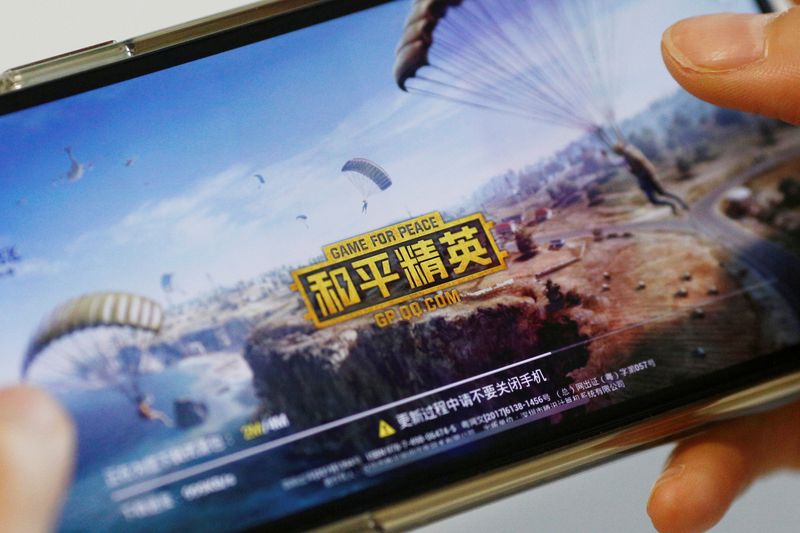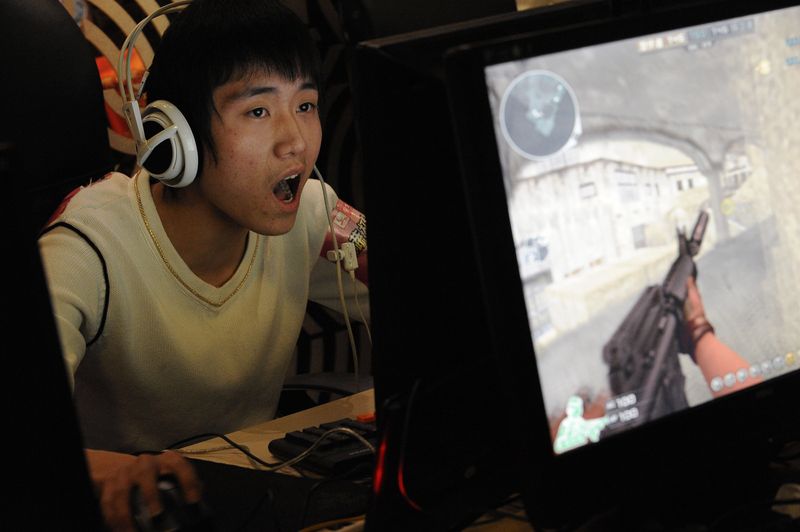By Josh Ye
HONG KONG (Reuters) -Chinese regulators announced on Friday a wide range of rules aimed at curbing spending and rewards that encourage video games, dealing a blow to the world's biggest games market, which returned to growth this year.
The new rules, which will effectively set spending limits for online games, sparked panic among investors, wiping off nearly $80 billion in market value from China's two biggest gaming companies, as investors sought to gauge the potential impact on earnings and more restrictions in the offing.
Online games will now be banned from giving players rewards if they log in every day, if they spend on the game for the first time or if they spend several times on the game consecutively. All are common incentive mechanisms in online games.
Shares in Tencent Holdings (OTC:TCEHY), the world's biggest gaming company, tumbled as much as 16% at one point, while those of its closest rival, NetEase (NASDAQ:NTES), plunged as much as 25% after the National Press and Publication Administrations published the new draft rules.
Shares of tech investor Prosus (OTC:PROSF) followed Tencent lower, losing 14.2% in early trade on Friday and were among the biggest fallers on the pan-European stock index. Prosus owns a 26% stake in Tencent.
"It's not necessarily the regulation itself - it's the policy risk that's too high," said Steven Leung, executive director of institutional sales at broker UOB Kay Hian in Hong Kong. "People had thought this kind of risk should have been over and had started to look at fundamentals again. It hurts confidence a lot."
When asked about the draft rules' impact, Tencent Games' vice president Vigo Zhang said Tencent will not need to fundamentally change "its reasonable business model or operations" for games, adding that the company has been strictly implementing regulatory requirements.
Zhang added that minors had been spending a historically low level of money and time on Tencent's games since 2021 when minor protection became a focus for Beijing.
NetEase declined to comment.
Beijing has become increasingly tough on video games over the years. In 2021, China set strict playtime limits for under 18s and suspended approvals of new video games for about eight months, citing gaming addiction concerns.
Although the crackdown formally ended last year with the resumption of new game approvals, regulators have continued to impose restrictions to curb "in-game" spending. The new rules revealed on Friday are the most explicit yet aimed at curbing in-game spending. Besides banning reward features, games are also required to set limits on how much players can top up their digital wallets for in-game spending.
"The removal of these incentives is likely to reduce daily active users and in-app revenue, and could eventually force publishers to fundamentally overhaul their game design and monetisation strategies," said Ivan Su, an analyst at Morningstar.
Games are also banned from offering probability-based lucky draw features to minors, and from enabling the speculation and auction of virtual gaming items.
But the new rules included a proposal that is widely expected to be welcomed by the industry, requiring regulators to process game approvals within 60 days.
Meanwhile, Chinese regulators announced on the same day licences for 40 new imported games for domestic releases, seen as a signal of Beijing's willingness to allow more games in the country, despite the draft rules on game spending. The new rules also reflect Beijing's concerns over user data, requiring game publishers to store their servers within China.

The administration is seeking public comment on the rules through Jan. 22, 2024. As a result of Beijing's crackdown on gaming in 2021, 2022 was the Chinese gaming industry's most difficult year on record as total revenue shrank for the first time. China's video game market returned to growth this year as domestic revenue rose 13% to 303 billion yuan ($42.6 billion), according to Industry association CGIGC.
The harsh draft rule also cast a shadow on gaming stocks globally. U.S. gaming stocks Roblox, Electronic Arts (NASDAQ:EA) and Unity Software slipped between 1.7% and 3.1% on Friday, while in Europe, French video games developer Ubisoft was down more than 3%.
